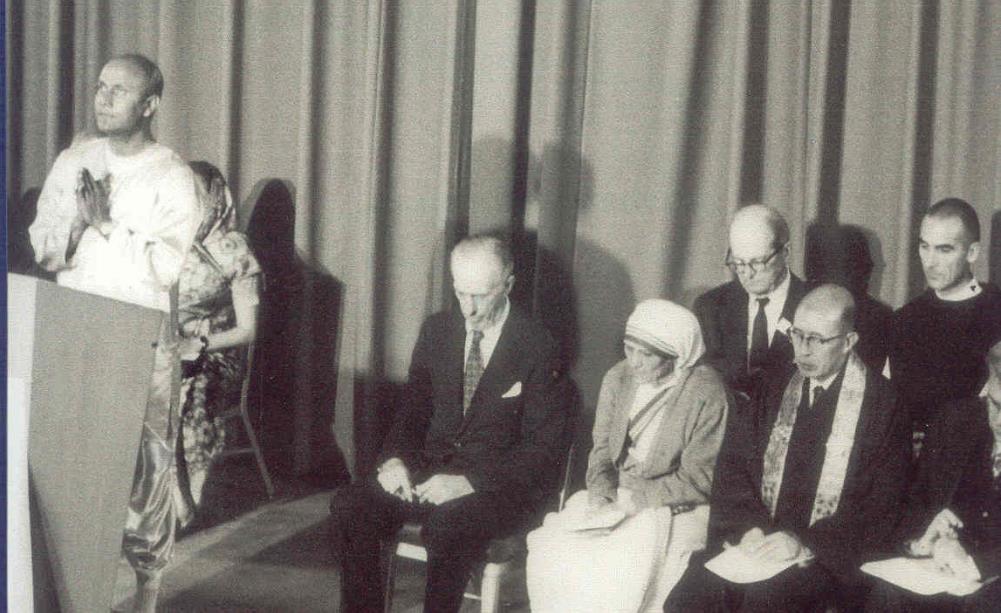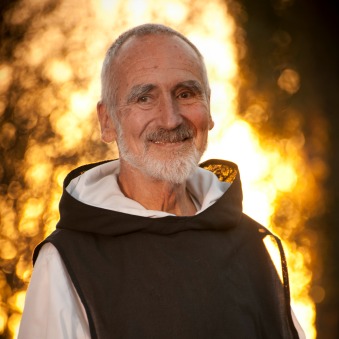
“The present state of worldwide anxiety, which is characteristic of all great periods of radical transition, must give way to an expression of dynamic hope and faith in the capacity of the human family, especially its youth, to build a new earth, a more humane community, a future open to greater joy and more creative becoming.”
Although this statement sounds freshly penned, it was composed at a gathering of spiritual leaders on the 30th Anniversary of the United Nations, October 24, 1975. Here’s how Robert Muller — who served as Assistant UN Secretary-General for 38 years and then as Chancellor Emeritus of the UN University for Peace in demilitarized Costa Rica — described the significance of the event, at which he was present:
Human unity is no longer a dream of the philosophers, humanists, and prophets. Human concerns and consciousness today are all-encompassing. They reach from the stars to the atom, from outer space to the core of the earth, from the atmosphere to the abyss of the seas, from food to microbiology, from world population to individual human rights. This is the product of a multitude of dreams and efforts of innumerable individuals and institutions. Within a short span of years we have witnessed the most incredible explosion of knowledge and concern radiating far into the universe and the infinitely small. What incredible progress, what gigantic steps have been accomplished! We have been given a Copernican overview, a magnificently clear framework, the skeleton of total understanding of our place and destiny in space and in evolution.
In October, 1975, on the occasion of the thirtieth anniversary of the United Nations, leaders from the Hindu, Buddhist, Christian, Moslem, and Jewish faiths assembled to consider the moral and spiritual dimension needed for our progress. Most impressive was the final ceremony, held in the U.N.’s Dag Hammarskjöld Auditorium. Lady Srimata Gayatri Devi of the Hindu faith spoke first: of the world’s seers, prophets, and visionaries who had been illumined by great unifying principles of spirituality, ethics, God, the presence of all in one and of one in all, the union between the inner self and world consciousness. The speakers for Buddhism, Islam, and Judaism held similar beliefs in the oneness of humankind and all nations under one God or unifying principle. At the end of the ceremony, Mother Teresa of Calcutta took the floor. Using sparse and simple words, she said:
“The poor are brothers and sisters in the same family, created by the same loving God. If you do not know them, you do not love them, and you do not serve them….We must love until it hurts, especially in these great United Nations.”
The extraordinary ceremony ended with a meditation under the guidance of Brother David Steindl-Rast, a Benedictine monk. Seldom had I seen such profound oneness in spirit, such vibrating understanding and warm goodwill under the roof of the United Nations.
Brother David’s meditation follows.
Meditation on the United Nations
Sisters and Brothers in the Spirit:
We have been witnesses of an important and deeply moving event, important not only for us who witnessed it, but also for the history of the United Nations and so for the whole human family.
It is only fitting that we should want to celebrate the closing of this great event by a grateful gesture of the heart.
But it would not be enough if someone pronounced a blessing or prayer in front of you. We must make this grateful gesture of the heart together at this moment. I invite you to do this.
Since we are truly one in heart, we ought to be able to find a common expression of the Spirit who moves us at this moment. But the diversity of our languages tends to divide us. Yet, where the language of words fails, the silent language of gestures helps to express our unity. Using this language then, let us rise and stand.
Let our rising be the expression that we are rising to this occasion in deep mindfulness of what it signifies.
Let our standing be a mindful gesture: mindful of the ground on which we are standing, the one little plot of land on this earth not belonging to one nation, but to all nations united. It is a very small piece of land, indeed, but it is a symbol of human concord, a symbol of the truth that this poor, mistreated earth belongs to all of us together.
As we stand, then, like plants standing on a good plot of ground, let us sink our roots deep into our hidden unity. Allow yourself to feel what it means to stand and to extend your inner roots.
Rooted in the soil of the heart, let us expose ourselves to the wind of the Spirit, the one Spirit who moves all who let themselves be moved. Let us breathe deeply the breath of the one Spirit.
Let our standing bear witness that we take a stand on common ground.
Let our standing be an expression of reverence for all those who before us have taken a stand for human unity.
Let us stand with reverence on the ground of our common human endeavor, joining all those who stood on this ground, from the first shaper of tools to the engineers of the most complex machines and institutions.
Let us stand with reverence on the common ground of the human quest for meaning, side by side with all who ever stood on this ground in their searching thought, in their celebration of beauty, in their dedicated service.
Let us stand in reverence before all those who on our common ground stood up to be counted, stood up – and were cut down.
Let us remember that to stand up as we have now stood up implies a readiness to lay down one’s life for that for which one stands.
Let us stand in awe before those thousands upon thousands – known and unknown – who have laid down their lives for the common cause of our human family.
Let us bow our heads. Let us bow our heads to them.
Let us stand and bow our heads, because we stand under judgment.
We stand under judgment, for “One is the human Spirit.” If we are one with the heroes and prophets, we are also one with those who persecuted and killed them. One with the henchmen as we are one with the victims. We all share the glory of human greatness and the shame of human failure.
Allow me to invite you now to focus your mind on the most inhuman act of destruction you can find in your memory. And now take this, together with all human violence, all human greed, injustice, stupidity, hypocrisy, all human misery, and lift it all up, with all the strength of your heart, into the stream of compassion and healing that pulsates through the heart of the world – that center in which all our hearts are one. This is not an easy gesture. It may almost seem too difficult for some of us. But until we can reach and tap with our deepest roots this common source of concord and compassion, we have not yet claimed within our own hearts that oneness that is our common human birthright.
Standing firm, then, in this oneness, let us close our eyes.
Let us close our eyes to bring home to ourselves our blindness as we face the future.
Let us close our eyes to focus our minds on the inner light, our one common light, in whose brightness we shall be able to walk together even in the dark.
Let us close our eyes as a gesture of trust in the guidance of the one Spirit who will move us if we open our hearts.
“One is the human Spirit,” but the human Spirit is more than human, because the human heart is unfathomable. Into this depth let us silently sink our roots. There lies our only source of peace.
In a moment, when I will invite you to open again your eyes, I will invite you also to turn in this Spirit to the person next to you with greeting of peace. Let our celebration culminate and conclude in this gesture, by which we will send one another forth as messengers of peace. Let us do this now.
Peace be with you all!
Reprinted with kind permission of the author from Most of All, They Taught Me Happiness, by Dr. Robert Muller (Amare Media LLC; January 2005).



Comments are now closed on this page. We invite you to join the conversation in our new community space. We hope to see you there!